|
|
|
Sort Order |
|
|
|
Items / Page
|
|
|
|
|
|
|
| Srl | Item |
| 1 |
ID:
113170
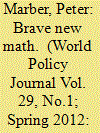

|
|
|
|
|
| Publication |
2012.
|
| Summary/Abstract |
In 1968, at age 56, my grandfather had a heart attack. It surprised a lot of people. With a full head of hair, he was thin, youthful looking, and rarely sick. He received standard patient treatment for the time-prolonged bed rest and morphine. When he recovered, he continued his pre-attack lifestyle which included smoking, almost no exercise, and a diet of meat, potatoes, and my grandmother's cream pastries. Five years later, he was dead, the result of another heart attack.
|
|
|
|
|
|
|
|
|
|
|
|
|
|
|
|
| 2 |
ID:
086874
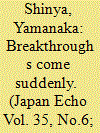

|
|
|
|
|
| Publication |
2008.
|
| Summary/Abstract |
Induced pluripotent stem cells are one of the hottest topics in medicine today. Expectations are rising for the use of iPS cells in regenerative medicine, and research is being carried out aggressively. Professor Yamanaka's team at Kyoto University led the world in successfully creating iPS cells in November 2007. He is now working to create a more open research environment like that in the United States and thinking about ways for Japan to get talented young people to pursue careers in science and technology
|
|
|
|
|
|
|
|
|
|
|
|
|
|
|
|
| 3 |
ID:
172664
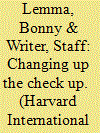

|
|
|
| 4 |
ID:
178160
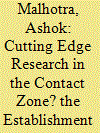

|
|
|
|
|
| Summary/Abstract |
By 1928, Robert McCarrison’s laboratories in the South Indian hill station of Coonoor had become recognised as the centre for nutritional research in India. Five years earlier, however, his institute had faced closure. This article argues that the establishment of McCarrison’s institute was based on his pitch to the Royal Commission on Agriculture in India in 1926, in which he successfully aligned his research to satisfy the concerns of various members of the Commission. This discussion uses McCarrison’s lobbying for his institute as a case study to examine the broader political manoeuvrings that colonial scientists in the early twentieth century often had to undertake to establish their research agendas.
|
|
|
|
|
|
|
|
|
|
|
|
|
|
|
|
| 5 |
ID:
125956
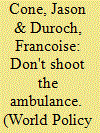

|
|
|
|
|
| Publication |
2013.
|
| Summary/Abstract |
LANKIEN, South Sudan-The wounded started arriving in the evening. A rusted-out pick-up truck dropped off four young men with gunshot wounds, two with life-threatening wounds to the abdomen and the others with leg injuries, at the 100-bed Médecins Sans Frontières (MSF) hospital here. Just hours earlier, the hospital's team and local residents had been playing volleyball as the sun began to set on a 106-degree day.
|
|
|
|
|
|
|
|
|
|
|
|
|
|
|
|
| 6 |
ID:
182854
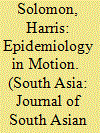

|
|
|
|
|
| Summary/Abstract |
This paper is an ethnographic account of traumatic brain injuries (TBIs) based on a study of a public hospital trauma ward in urban India. It explores the contexts, causes and consequences of TBIs in order to make several broader claims. Across two case studies, I argue that epidemiological transitions towards non-infectious disease regimens must be understood as problems of somatic movement. The implication is that bodies make transitions through actual and imagined changes in bodily movements that define how persons become patients, how traumatic injury pulls on clinical resources, and how differences in gender, sexuality, class and caste affect the social dynamics of brain injury in urban settings at every turn.
|
|
|
|
|
|
|
|
|
|
|
|
|
|
|
|
| 7 |
ID:
131785
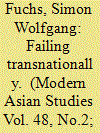

|
|
|
|
|
| Publication |
2014.
|
| Summary/Abstract |
This paper adds to the growing literature on transnational Shi?ism which has so far mostly focused on social history and political contestations. By tracing the thought, transnational legacy, and ultimate failure of the reformist Shi?i scholar, Muhammad al-Khalisi (d. 1963), I argue for the crucial importance of local contexts and ideas for the genesis of Islamic modernist projects. In his native Iraq, al-Khalisi not only distinguished himself as a guerrilla fighter and political activist but also was shaped by prevailing notions about the compatibility of Islam and science. Exiled to Iran for his opposition to the British from 1922 to 1949, he encountered there specific medicalizing discourses on modernity. This exposure and his experience as a practitioner of medicine in the Iranian countryside led al-Khalisi to identify medicine as the master key to unlocking the secrets of the divine law, the shari?a: his major work on Islamic law singles out human health as God's supreme concern. Back in Iraq during the 1950s, al-Khalisi's medical-scientific vision of modernity was finally complemented with an uncompromising call for intra-Muslim unity. This stance led to furious attacks against al-Khalisi which continue unabated in contemporary Pakistan where his name has become a term of abuse.
|
|
|
|
|
|
|
|
|
|
|
|
|
|
|
|
| 8 |
ID:
141065
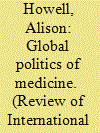

|
|
|
|
|
| Summary/Abstract |
This article makes the case for a new field in International Relations (IR): the Global Politics of Medicine. It argues that significant avenues of research can be opened up by focusing on medicine and the life sciences, in order to both challenge current IR theories, and develop new theoretical and empirical insights in IR. In particular, the article challenges the validity of securitisation theory, and specifically the argument that health has been securitised. Showing instead that medicine and warfare have been imbricated from the nineteenth century as strategies of population, it challenges securitisation theory's ahistoricism and its assumption that social security and international security (and the norm/exception) are analytically divisible. Bringing this into the present through the examples of triage, psychological resilience, and genetic intelligence in counterinsurgency, it traces how warfare and medicine now ambitiously seek to treat populations as sets of individual bodies. Arguing that we cannot retreat to some mythical state of politics ‘prior’ to securitisation, it draws out how the fields of war, health, and medicine are nonetheless highly contested. The article concludes by challenging the fields of Global Health, war, and security studies, but also suggests novel routes for pursuing the study of the Global Politics of Medicine.
|
|
|
|
|
|
|
|
|
|
|
|
|
|
|
|
| 9 |
ID:
184791
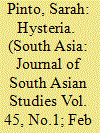

|
|
|
|
|
| Summary/Abstract |
Ways of mapping mental illness in the world involve stories about history, time and qualities of knowledge. This paper explores the history of hysteria as a South Asian story. With a South Asia-centred history of the contemporary critical concept of cultural translation, this paper observes not only hysteria’s long South Asian history, but the colonial emergence of a defining narrative—the equation of hysteria to spirit possession, a naturalised conceptual arrangement that superimposed upon a long history of medical encounters racialised ideas about epistemological difference.
|
|
|
|
|
|
|
|
|
|
|
|
|
|
|
|
| 10 |
ID:
153082
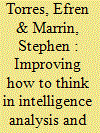

|
|
|
|
|
| Summary/Abstract |
Common thinking strategies can be used by both intelligence analysts and medical doctors to improve decision-making and produce positive outcomes. Best practices can flow in both directions between professions since medicine shares strong parallels with intelligence analysis. Improving performance in both fields involves an assessment of key problems and current efforts to overcome them. Perhaps the most important issues affecting both fields are related to cognition. In medicine and intelligence analysis, errors are often triggered by cognitive biases that appear during the decision-making process. Identifying and preventing these errors would contribute towards improving performance and results in both fields.
|
|
|
|
|
|
|
|
|
|
|
|
|
|
|
|
| 11 |
ID:
138046
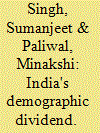

|
|
|
| 12 |
ID:
192995
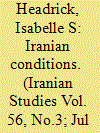

|
|
|
|
|
| Summary/Abstract |
The staff of the Alliance Israélite Universelle (AIU), an international educational philanthropy, were professionally and personally buffeted by health and medical concerns. This article examines the value of their letters, arguing they serve as a deep reservoir of biased yet valuable evidence that corroborates other sources while also providing insight into the health and disease conditions of Iran's provincial cities. This article also asks why, in the early twentieth century, AIU staff failed to acknowledge Iranians who were similarly invested in medical services and public hygiene. Ultimately, the letters help scholars witness historical evolutions in Iran and in the AIU staff's understandings of the Iranian social and medical landscape they inhabited.
|
|
|
|
|
|
|
|
|
|
|
|
|
|
|
|
| 13 |
ID:
096280
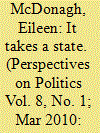

|
|
|
|
|
| Publication |
2010.
|
| Summary/Abstract |
American women attain more professional success in medicine, business, and higher education than do most of their counterparts around the world. An enduring puzzle is, therefore, why the US lags so far behind other countries when it comes to women's political representation. In 2008, women held only 16.8 percent of seats in the House of Representatives, a proportion that ranks America lower than 83 other countries. This article addresses this conundrum. It establishes that equal rights alone are insufficient to ensure equal access to political office. Also necessary are public policies representing maternal traits that voters associate with women. Such policies have feedback effects that teach voters that the maternal traits attributed to women represent strengths not only in the private sphere of the home but also in the public sphere of the state. Most other democracies now have such policies in place, but the United States lacks such policies, which accounts for its laggard status with regard to the political representation of women.
|
|
|
|
|
|
|
|
|
|
|
|
|
|
|
|
| 14 |
ID:
182841
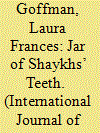

|
|
|
|
|
| Summary/Abstract |
This article examines ʿAbd al-Ilah al-Qinaʿi's early 20th-century melding of local, imperial, and transoceanic health practices alongside his 21st-century reemergence as a protonational Kuwaiti doctor. In the early 20th century, geographically and ideologically expansive horizons of health care fostered the emergence of hybrid medical practices. Facilitated by his access to multiple medical spheres and his proximity to Kuwait's rulers, ʿAbd al-Ilah was uniquely positioned to meet the demands of health-seeking consumers. In the 21st century, Kuwaitis' search for a national history that naturalizes claims to citizenship has resulted in ʿAbd al-Ilah's new designation as Kuwait's first doctor. Both processes—the interplay between local cultures of health and emergent institutions and the imagining of medical history as a nativist teleology—demonstrate how health-seeking and history-writing efforts of a range of historical actors have placed medicine at the center of politics in Kuwait.
|
|
|
|
|
|
|
|
|
|
|
|
|
|
|
|
| 15 |
ID:
123237
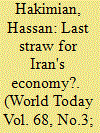

|
|
|
| 16 |
ID:
178153
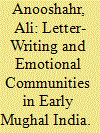

|
|
|
|
|
| Summary/Abstract |
This article investigates the letter-writing manual of the physician Muhammad Yusufi Haravi, composed in the 1530s at the court of the Mughal emperor, Humayun. It argues that by prescribing proper expressions of emotion based on one’s rank, the text reflects a combination of courtly desire and medical expertise which hoped to (but could not) transform the body politic (Mughal elite) into an emotional community. This was because the rapid establishment of Mughal rule in North India quickly scattered elite individuals far from their kinship groups, and the formation of a new social organisation, with the emperor at its apex, was a way to deal with the alienation that resulted from the breakup of kinship bonds.
|
|
|
|
|
|
|
|
|
|
|
|
|
|
|
|
| 17 |
ID:
106510
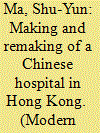

|
|
|
|
|
| Publication |
2011.
|
| Summary/Abstract |
Hong Kong's hospital system has long been the territory of Western medicine. However, during the Severe Acute Respiratory Syndrome (SARS) outbreak in 2003, an integrative approach, combining Chinese and Western medicines, was used in some hospitals in Hong Kong, suggesting a revival of Chinese medicine in the hospital system of this former British colony. This paper will explain how this could happen, by situating the event in the over 160 years' long history of Chinese medicine in Hong Kong. Specifically, it will focus on the role of 'Chinese medicine' and 'traditional Chinese medicine' in Tung Wah Hospital, a local charity established in 1870, which grew subsequently into one of the largest voluntary organizations in Hong Kong. It will also show how the fall and revival of Chinese medicine in this hospital were related to two epidemics: the bubonic plague in 1894, and the SARS outbreak in 2003.
|
|
|
|
|
|
|
|
|
|
|
|
|
|
|
|
| 18 |
ID:
153099
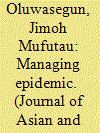

|
|
|
|
|
| Summary/Abstract |
This paper examines how the British managed the 1918–1919 influenza epidemic in Lagos, the reactions of the local population to new sanitary and medical policies enforced during the period, and its social and political implications for future epidemic management in the colony. Unlike several studies which approach the history of the pandemic from global and national perspectives, a focus on Lagos, the colonial capital of Nigeria, one of Britain’s most important colonies provides this paper with a rare opportunity to engage with how local peculiarities informed decisions about the resolution of a global problem. Lagos is chosen as the terrain for discussion because of the ample data generated about it in the course of the 19th and 20th centuries (not just between European missionaries and the indigenous Lagosians, but also for other influential cultural and ethnic groups such as the Saro and Amaro (migrants from Brazil), and the Indian influence on medical policies in Lagos).
|
|
|
|
|
|
|
|
|
|
|
|
|
|
|
|
| 19 |
ID:
153130
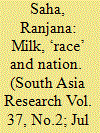

|
|
|
|
|
| Summary/Abstract |
This article analyses medical opinion about nursing of infants by memsahibs and dais as well as the Bengali-Hindu bhadramahila as the ‘immature’ child-mother and the ‘mature’, ‘goddess-like’ mother in the tropical environment of nineteenth and early twentieth century Bengal. It shows how the nature of lactation, breast milk and breastfeeding are socially constructed and become central to medical advice on motherhood and childcare aimed at regenerating community, ‘racial’ and/or national health, including manly vigour for imperial, colonial and nationalist purposes. In colonial Bengal, the topic of breastfeeding surfaces as crucial to understanding colonial and nationalist, medical and medico-legal representations of maternal and child health constituted by gendered, racialised, classed and caste-ridden, biological/cultural and pure/polluting traits, often considered transferable through milk and blood.
|
|
|
|
|
|
|
|
|
|
|
|
|
|
|
|
| 20 |
ID:
163881
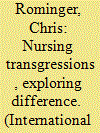

|
|
|
|
|
| Summary/Abstract |
This article explores the social impact of North African soldiers’ experiences in French military hospitals during World War I. In particular, it examines improvised “Muslim hospitals” that were opened in order to isolate North Africans from French civilian society. Colonial and military officials believed that North Africans, presumed to be warlike, pathogenic, and promiscuous, could corrupt and be corrupted by the French public. Yet while existing literature tends to highlight the dehumanization of North Africans at the hands of military and medical authorities, this article, drawing from personal correspondence, photographs, and military and medical records, reveals a more ambiguous daily reality. I argue that the individual needs and desires of wounded North Africans and of French nurses, as well as material limitations and contingencies, created spaces for an unprecedented series of humanizing personal encounters. In military-medical “colonies within the metropole,” these soldiers found themselves caught between a newfound sense of affinity with the French public and a starker sense of the boundaries of colonial practice.
|
|
|
|
|
|
|
|
|
|
|
|
|
|
|
|
|
|
|
|
|